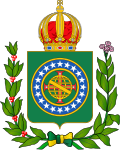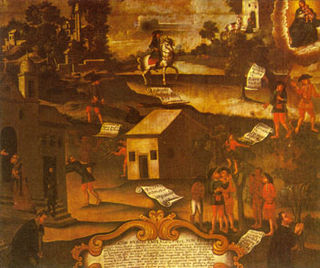
The War of the Emboabas was a conflict in colonial Brazil waged in 1706-1707 and 1708-1709 over newly discovered gold fields, which had set off a rush to the region between two generations of Portuguese settlers in the viceroyalty of Brazil - then the Captaincy of São Vicente. The discovery of gold set off a rush to the region, Paulistas asserted rights of discovery and non-Paulistas challenged their claims. Although the Portuguese crown sought more control in the area and the Paulistas sought protection of their claims, the Emboabas won. The crown re-assessed its position in the region and made administrative changes subsequently.

The Metropolitan Archdiocese of Brasília is ecclesiastical territory or archdiocese of the Latin Church of the Catholic Church located in the city of Brasília in Brazil. The archdiocese is a metropolitan see.
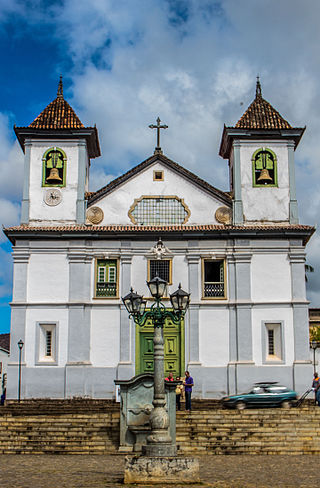
The Roman Catholic Archdiocese of Mariana is an archdiocese based in the city of Mariana in the Brazilian state of Minas Gerais.

Luís Gonzaga Pinto da Gama was a Brazilian rábula, abolitionist, orator, journalist and writer, and the Patron of the abolition of slavery in Brazil.

Events in the year 1902 in Brazil.

Events in the year 1903 in Brazil.

Events in the year 1904 in Brazil.

Events in the year 1927 in Brazil.

Events in the year 1954 in Brazil.

Events in the year 1951 in Brazil.

Events in the year 1987 in Brazil:

The following lists events that happened in the year 1989 in Brazil.
Júnia Ferreira Furtado is a Brazilian historian and university professor. She retired from the Universidade Federal de Minas Gerais (UFMG) in 2016.

The Constituent Cortes of 1820, formal title The General and Extraordinary Cortes of the Portuguese Nation, also frequently known as the Sovereign Congress or the Cortes Constituintes Vintistas, was the first modern Portuguese parliament. Created after the Liberal Revolution of 1820 to prepare a constitution for Portugal and its overseas territories, it used a different system from the traditional General Cortes for choosing representatives, and the three traditional feudal estates no longer sat separately. The Cortes sat between January 24, 1821 and November 4, 1822 at the Palácio das Necessidades in Lisbon. The work of the Constitutional Cortes culminated in the approval of the Portuguese Constitution of 1822.
The 2020 Copa do Brasil second round was the second round of the 2020 Copa do Brasil football competition. It was played from 18 February to 5 March 2020. A total of 40 teams competed in the second round to decide 20 places in the third round of the 2020 Copa do Brasil.
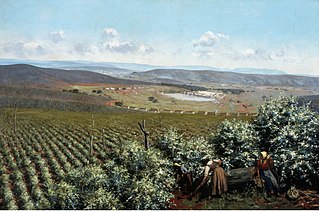
In Brazil's economic history, the coffee cycle was a period in which coffee was the main export product of the Brazilian economy. It began in the mid-19th century and ended in 1930. The coffee cycle succeeded the gold cycle, which had come to an end after the exhaustion of the mines a few decades earlier, and put an end to the economic crisis generated by this decadence.
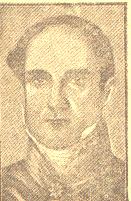
José Carlos Pereira de Almeida Torres, 2nd Viscount of Macaé, was a Brazilian magistrate and politician, who served as Prime Minister of Brazil in 1848.
João Camilo de Oliveira Torres was a Brazilian writer, professor, historian and journalist.












